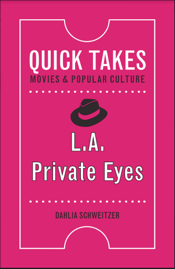
About Dahlia
DAHLIA SCHWEITZER is a pop culture critic, writer, and professor. Described by Vogue as “sexy, rebellious, and cool,” Schweitzer writes about film, television, music, gender, identity, and everything in between. She studied at Wesleyan University, lived and worked in New York City and Berlin, and completed her MA and PhD at the Art Center College of Design and UCLA. She is currently chair of the Film and Media department at the Fashion Institute of Technology in New York City.
In addition to her books, Dahlia has essays in publications including Cinema Journal, Journal of Popular Film and Television, Hyperallergic, Jump Cut, Quarterly Review of Film and Video, and The Journal of Popular Culture. She has also released several albums of electronic music, including Plastique and Original Pickup.

Professor
As a professor of film and media studies, Dahlia exposes her students to a variety of theoretical approaches and cinematic techniques, asking them to approach both with analytical inquisitiveness. Her aim is to pass her own curiosity on to her students, encouraging them to think across their classes and experiences to create intellectual connections between course materials and the world in which they live. She strives to remind her students that the loudest voice is not necessarily correct, and in so doing, helps them find their own.

Media Critic
Declared “one of the world’s leading analysts of popular culture” by renowned author Toby Miller, Dahlia writes about film, television, music, gender, identity, and everything in between. Her work can be found across mainstream, academic, and emergent channels in both long and short form. Repeatedly drawn to popular culture, Dahlia loves to analyze and unpack cultural artifacts in order to explore how they reflect social and historical issues, as well as looking at how they reinforce or interrogate common cultural assumptions.

Author
Dahlia has written numerous books exploring aspects of film and television. Regardless of the topic—serial killers, private detectives, or even zombies—all of her writing engages directly with questions of self versus other, private versus public space, examining depictions of gender, identity, and race. She traces how these depictions evolve and examines what they mean about our changing world. In her latest project, Dahlia explores the ways haunted homes have become a venue for dramatizing anxieties about family, gender, race, and economic collapse.
Blog
Why Shrill Sabotages Its Own Empowerment Message
(If you plan to watch Shrill and care about spoilers, definitely don't read this until after you've caught up.) Shrill, one of Hulu's recent contributions to original television content, is emphatically marketed as "empowering," mainly because its protagonist (Annie, played by Aidy Bryant) refuses to go on a diet. It is, according to the Hulu press release, "the story of a fat young woman who wants to change her life — but not her body." We are supposed to cheer for Annie during every...
The Problem with ‘A Star Is Born’
Warning: SPOILERS. Bradley Cooper and and Lady Gaga in a scene from A Star is Born, which Bradley Cooper also directed. Hollywood loves a good makeover montage, and the story told within A Star Is Born—successful musician stumbles upon a talented but unknown singer, launching her into stardom as he self-destructs—is so compelling that it gets remade and remade, drawing talent such as Judy Garland, Barbra Streisand, and most recently, Lady Gaga, to the role of the unknown singer. Despite the...
A Case for Clemency: Why the Menendez Brothers Should Be Released
These days, the world feels crushingly bleak. There is no shortage of horror in our daily news, no shortage of abuses by those in power, no shortage of inequalities and injustices—and all these can leave you (me) crushed by the steamroller that has become a regular part of our life these days. As I see it, there are two options. You can choose to feel utterly overwhelmed or you can try to pick out the occasional cause that maybe you can do something about, a small and focused injustice that...




